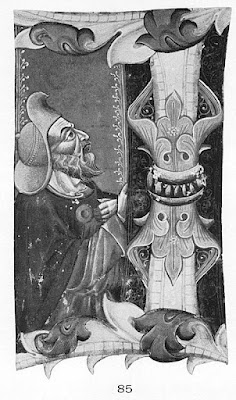In a previous blogpost about "Another Hachette-Lehman-Yale Cutting" (here) I referred to the catalogue of an auction held in Paris in 1934, to which I did not have access at that time. I have now seen a copy, and it adds to the group of cuttings discussed in that blogpost.
 |
| Catalogue des dessins, aquarelles, gouaches, anciens et modernes, ... enluminures des XIVe et XVe siècles, appartenant à Madame X ... 15 décembre 1934 |
The 15th-century Italian (Venetian?) lots that concerned me in the previous post are here described as 14th-century French, lots 85 to 87:
The whereabouts of lot 85 are not known to me. Lot 86, described as a man dressed in red, his right hand raised, was most recently sold by Koller, Zurich, 18 September 2015, lot 156:
Lot 87, described as a man in grey-blue and pink cloak, with hands held together, was in the André Hachette (d. 1945) collection and is now at Yale:
Between the 1934 sale in Paris and the 2015 sale in Zurich, the initial with the man dressed in red was sold at Sotheby's, London, 11 December 1961, lot 126. Lot 127 in the same sale describes:
"a bearded figure with boldly modelled features wearing a brown hat and red cloak over a blue tunic, a half-length figure beside an initial I, decorated with blue and green acanthus leaves on a patterned gold ground".
The Sotheby's description reports that this had been sold in the 1934 Paris sale, and fortunately all three cuttings are reproduced in the catalogue, so we can see just how similar this one is to the other two:
If we compare the old monochrome photographs with modern colour ones, it is striking how the former emphasise the "sculptural" qualities of the modelling of surfaces such as the faces and hands:
This makes them look even more like the cuttings published by Ágnes Tóvizi [1], which she attributed to a later follower of the Master of the Murano Gradual:The comparison is particularly close with this strangely foreshortened figure published by Tóvizi:
which can be compared, for example, to this figure by the Murano master (the similarities even extend to details such as the 'S'-shaped drapery folds at the throat and the chest):









No comments:
Post a Comment
** PLEASE INCLUDE YOUR NAME IN YOUR COMMENT **
I may ignore and delete anonymous comments